Defend The Land..
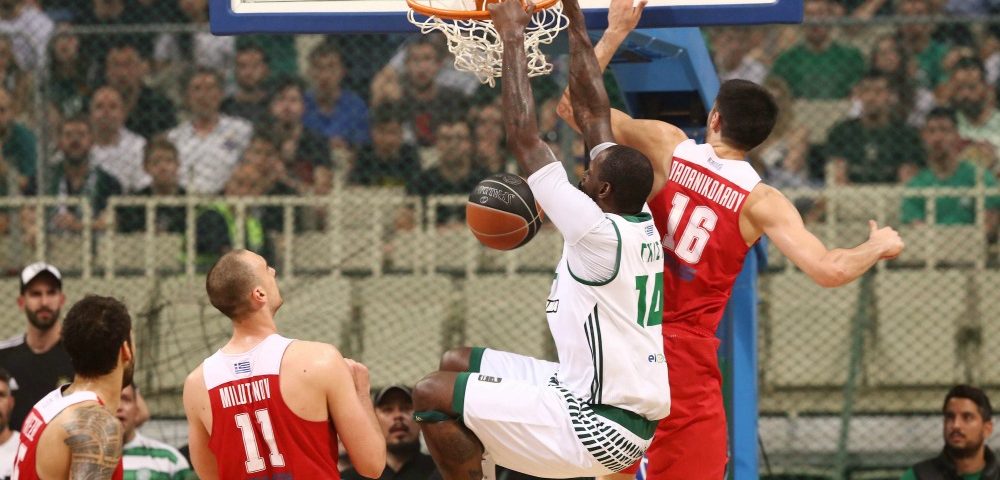
By Jim Katsionis on 11 June 2017
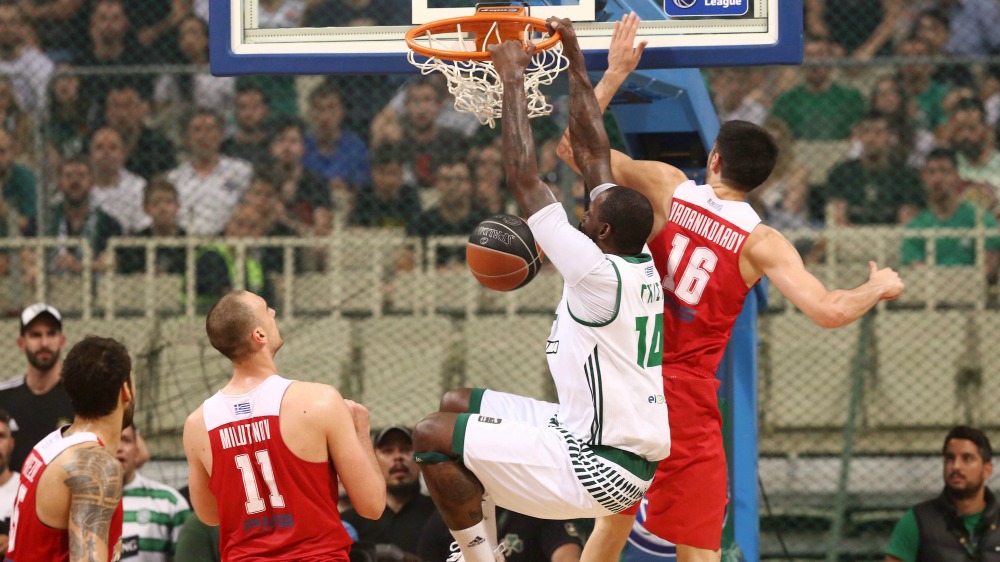
The aggressive compact Panathinaikos of Xavi Pascual sent Olympiacos to the “Painland” for 40 minutes in Game 4 and the two teams have now defended their land. The Reds are ready to finish off the series in their home court, while the Greens have high morale for the title game in a game where every possession and defense will be played out like there’s no tomorrow. Hoopfellas starts the biggest day of the season as it should…
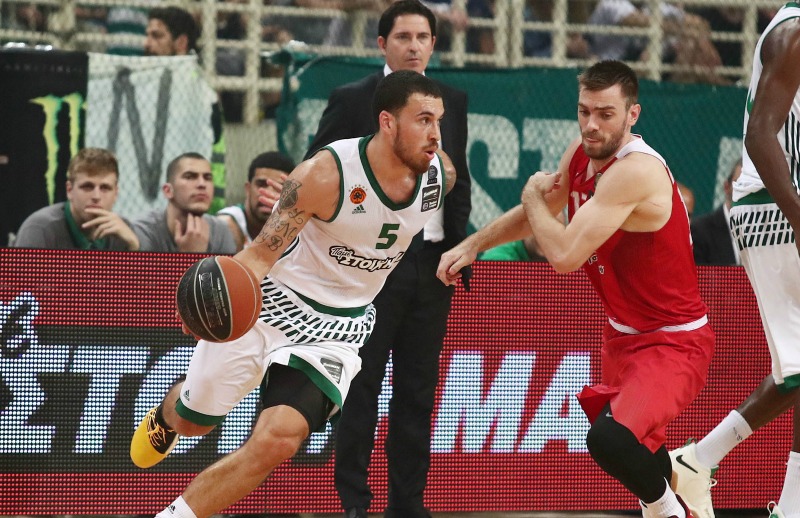
The greatest performance by a team in this series came in Game 4 by Xavi Pascual’s Panathinaikos, who punched away on their opponent from the very beginning and got what they deserved. One last roll of the dice for the title… Fatigue got in the mind of Olympiacos, who are determined to defend their title in their home and gather all the strength they have left. The tie and game 5…
Let’s begin with our notes from Game 4…
The –much talked about in our community- Compact Panathinaikos, for whom we had talked about before the start of the season was good in Game 4 and gave one of the best performances of the year, and in general one of the best defensive performances of the team this year. Honestly, it doesn’t matter how we got there…Sometimes (especially in playoff series) an injury, a mandatory change of the initial rotation, or an adjustment in which you are force by the matchup with your opponent, may bring things to light that you couldn’t see or had left aside until now. Things that finally work to your benefit and may show you the way to the future. The lineup with a Big-F at the “3” position (Gabriel), for which we have opened up a chat in the series with Fener, may show Panathinaikos the next day. Coach Itoudis’ CSKA did it last year and got to the top of Europe… However, it required James Gist in a really good situation and a tendency to run the court in the minutes of this unit, clearly caused by the way this particular lineup defended. This is why (Gist’s injury, the different offensive philosophy of coach Pascual) it was almost forgotten throughout the season. The circumstances (Gabriel’s good condition, Gist’s readiness in Game 4) favoured the Greens and led to this result. Panathinaikos was built to play this kind of basketball this year. This is what we had in mind for this team, and we hoped that Xavi Pascual’s arrival will make the team “wiser” in the half court.
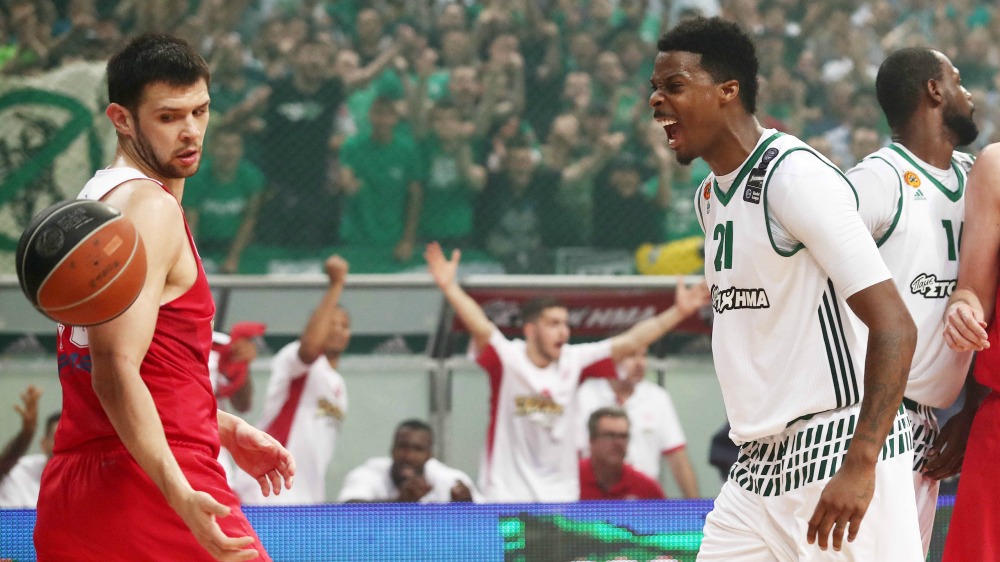
ICE was set aside and the home team went to clear switches with Triple Switch, which required a better and faster defensive communication to enjoy its benefits, that is, your guard avoiding an unpleasant miss match down low. These lineups, which we, here at Hoopfellas, named “compact” (solid, “longer” and faster than they look at first glance, able to defend against various opponents)-a term adopted by everyone now- may be a “multi-tool” on the defensive end, as they offer a large tank of choices to the coach (spread defenses, zone/m2m trapping zones, zone adjustments, e.g. 3-2 with the Big-F on the “head”).
Olympiacos were never able to adjust at any point of the game and this was due to several factors. They had an inherent (very strange for this team that knows well how to decode quickly and read the defense’s weakness) to strike (not necessarily execute, but pass the ball for an entry pass to the execution process) quickly and strike when the Greens defence was recovering. A very short period, but very important to unlock a defense of this nature. Filtering a bit more this behaviour of the Reds, I tend to conclude that they didn’t want this defensive choice of their opponents to “rush” their times on offense, and make them attack quicker, keeping the pace they had set as a goal.
The Stamina file
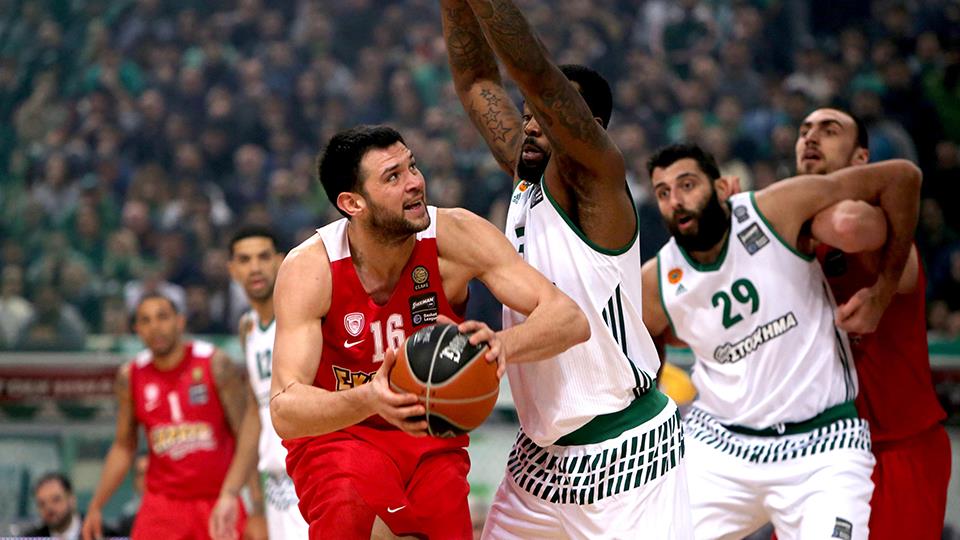
Olympiacos has been screaming for quite some time now that they don’t have the stamina to support their game, which was based on that throughout the season. The season was long and their injuries have made the situation even more difficult in its final stretch. At the same time Milutinov’s form has (justifiably) chipped away the minutes of Khem Birch, one of the main players in the High Energy game of the Reds, given the fact that with the Canadian on the floor, the champions play a different kind of defence, which leads them to seek the open court more.
Since we are talking about the “open court”… Olympiacos of the sole playmaker on half court are trying to be productive in set game (their tendency for offensive rebounds helps) and keep their strength, and I think it’s very important to note that of the three best transition players, two of them are sidelined and the third is putting his body to the test. Lojeski’s absence has taken away a great (possibly the greatest) weapon in transition offense, and at the same time they are missing the great defensive aggressiveness of Daniel Hackett, who created many situations on offense. The third pillar, Giorgos Printezis, is a chapter on his own. He is a forward that runs the court like a backcourt player, and posts as a post player, with his early posts being the main expression of the Reds defense in the open court. His unbeatable footwork seems weaker and his fatigue has brought him to his limits in his finishes in the paint. Also note that (in conjunction with the above) Chris Singleton is becoming more and more experienced in defending against him and decoding the moves of the star of the Reds. The American F/C’s long arms and good footwork have made Printezis receive the ball high on the side isos of Giannis Sfairopoulos and spend more energy in his effort to dribble deep in the paint. This loss of energy shows is his finishing… Today Panathinaikos look to have the luxury of playing single defense against Printezis in the low post, which is on its own a G R E A T W I N for their team defense.
Olympiacos’ trouble in the entry pass
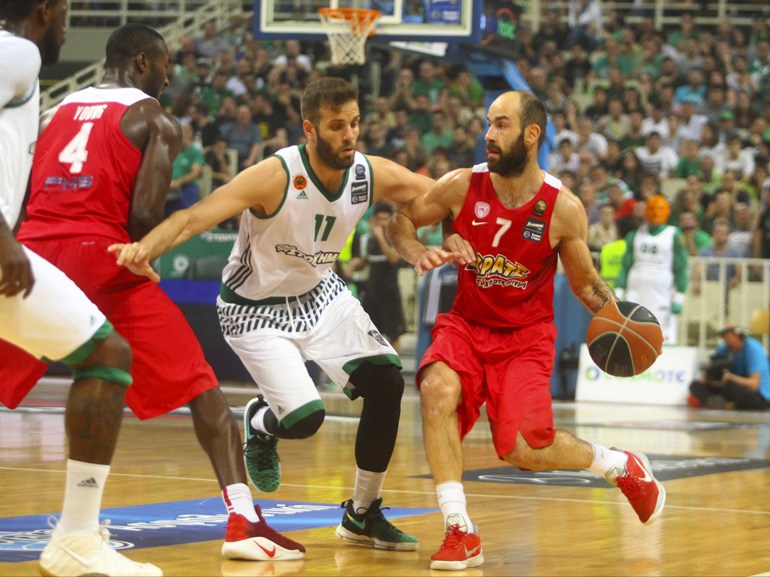
Panathinaikos tried (for the first time from the beginning) to play 4/4 defense on the entry pass to Milutinov with Bouroussis. It’s a fact that the Greek big man does not have the footwork to be effective in this type of defense against the 1 in-4 out Olympiacos defense, as he finds it difficult to follow when the passing angle changes and the ball moves. Despite all this, it was one of the situations that indicated once more the problem of the Reds in the entry pass to the paint. Especially without Spanoulis on the floor, this difficulty is important to the degree that it tends to disable several miss match situations in their favour.
The aggressiveness of Panathinaikos’ defense played a part in this on both ends of the court. For the first time in the series the Greens were so aggressive up high when in the final stretch of Olympiacos’ possession and on the back line of their defense there was a miss match against them, by putting great pressure on the ball and denying the pass down low, having the clock on their side. We have said before that, after Spanoulis, it is Printezis who has the safest hands for an entry pass to the paint under pressure at the moment (to be honest while I was wondering why coach Sfairopoulos doesn’t go for that, we saw it happening through 1-3-1 offense). However we should keep in mind that Printezis is the main person to execute down low and usually (with the late addition of Milutinov) he is the one that receives this pass.
Unfortunately for the Reds, Waters looks like he never entered these finals, verifying that he was the wrong choice for coach Sfairopoulos, when he had to make the very important decision of replacing Daniel Hackett. Hoopfellas has talked much about why the backup PG reflects the quality of a roster in modern European basketball. Waters is a professional and a good player (he had a super post season last year, one of the main reasons why Aris thssaloniki took Panathinaikos to game 5 in the semifinals), but he is far from what Olympiacos needed, as they didn’t manage to exploit any of his assets at this level. Coach Sfairopoulos’ team needed such a player to unlock well organised defenses and mainly offer something different (as an X-factor, making the team less predictable) in the second half of the season. We had talked then about Edgar Sousa and Briante Weber (different players with several strong assets that would have given other things in these available 10-12 minutes)…
AST/TO ratio, the code of the title (what we’ve already said…)
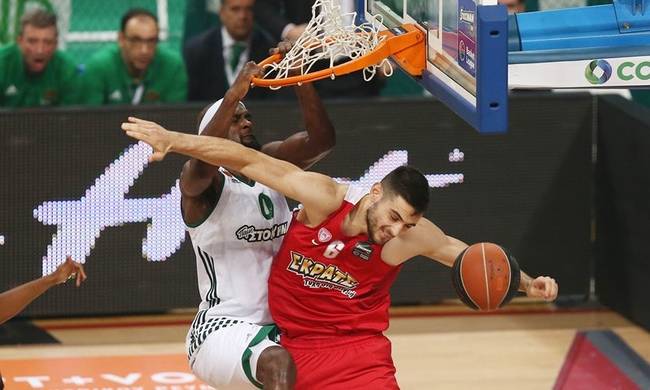
We have pointed out many times during this season that the key for someone to beat this very strong both game-wise and mentally team of Olympiacos is in the assist-turnover ratio of their game. After all, we started with this index as a point of reference (and the way each side read it). In game 4, it was made clear even to those who randomly watch basketball why we had focused there to that degree…
For the first 120 minutes of the series Panathinaikos were better, but they were behind with 2-1, as Olympiacos had a much higher AST/TO ratio than usual, which was the Achilles heel for them during this year. This showed concentration and clear mind… It is obvious that this index is more than anything affected by the man who takes the decisions in their offense, Vassilis Spanoulis. I take for granted that Olympiacos creates a better condition to win a match in this level, when their captain has an AST/TO ration greater or equal to 2 (even if he misses the shots he takes), rather than when he has something like 4/6 or 4/7 three pointers… This is how important this is…
There obviously is an interpretation for the 13/23 AST/TO of the Reds (17/6 for the Greens) in game 4 and this is due (not entirely, but to a great extent) to the change in the defensive direction of the Greens, which was activated when Gist got more minutes at the “5” position. At the same time their defense became more aggressive and looked to make their opponents turn the ball over, not wait for them to do it. Panathinaikos stole the ball 12 times and scored in the open court, capitalising on the deflections their defense gave them and the difficulty they put on the Reds mind, as they were made to go to one on one plays against certain defensive players. I have to repeat that the “Clover” has been built to play this basketball. The nature of the player that was given the keys to the team (Calathes) is to operate within this context exactly… The great question for Olympiacos (an elite toughness team in European basketball) is why the team got into a Turnover mode (7 turnovers in the first period, they had 9.3 turnovers in the series up to that point) and couldn’t get themselves out of it…
This index is, in my humble opinion, the decisive factor of game 5 of the series…
Side Pick
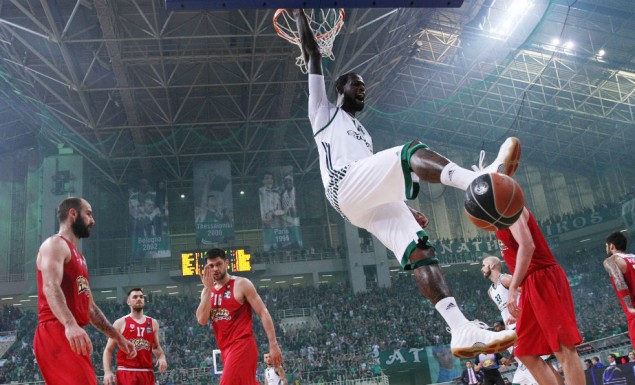
When Olympiacos changed positions in the 1-3-1 (Papapetrou as the last player), and tried to find –except for the very hot Green- a point of reference in their offense, the Greens (their will to find Rivers after down screens so he can execute, as opposed to looking for post ups, not weak side offense with spot shots of the American after flare, through Stack Format) relied on their Pick&Roll weapon, as Gist and Calathes were feeling god after the first minutes. It’s easy to understand that apart from defense, Gist’s increased minutes on the floor (combined with Calathes being in the lineup) also change the direction of the offense of Pascual’s team. Try to interpret that in conjunction with Birch’s few minutes and connect the dots…
Coach Pascual insisted on situations that included Gist in multiple screens, both on and off the ball (on the middle lane or on the sides) with the guards of the Greens winning early the advantage of space after the 1-2 running floaters they made, thus preventing the big man from staying close to the rim. Panathinaikos were after a long time efficient in their Side Picks, on which they had heavily relied in last season’s finals with Calathes-Diamantidis as their main ballhandlers. Nick Calathes had a good night (he score 12 points quickly) and this changed things in terms of spacing, when he got in the paint with speed dribble, reading what was within his sight, which produced points for the Greens and provided them with a constant in their offense.
In total Olympiacos (5-out offense aiming at getting their opponents’ defense up high, Gaggle with Papanikolaou for his efficient outside shots from 45 degrees, which were off the mark in game 4) showed signs of fatigue that affected their players’ minds and their communication on defense. The Reds found it difficult to match Singleton’s ability (in general he is a player that’s not easily matched due to the diversity in execution through various situations) to score from every position, and, even when they tried to Deny him in Horns, they were exposed by their poor communication, which is unusual for such a well-worked team.

See here the poor defensive transition of the Reds and the perfect fast break of the Greens without even dribbling once.

Hoopfellas has mentioned before the Wing Skills hidden in Singleton’s package, and Xavi Pascual has identified them and he has given the player peripheral actions in Diamond or using Shuffle offense for the American. On the other side, Eric Green was the only player of the Reds that was connected with the basket, but the nature of his offensive game (one on one peripheral execution, overdribbling, difficulty in running PnR situations) sometimes makes Olympiacos (this version of them, the one without too many breaths) vulnerable in their defensive transition, and he doesn’t include the rest of his teammates on offense. Giannis Sfairopoulos saw that his team was unable to get back in the game and he chose to keep Spanoulis-Printezis on the bench in light of the decisive game 5.
Edge of tomorrow: Game 5, with everything that comes with it…
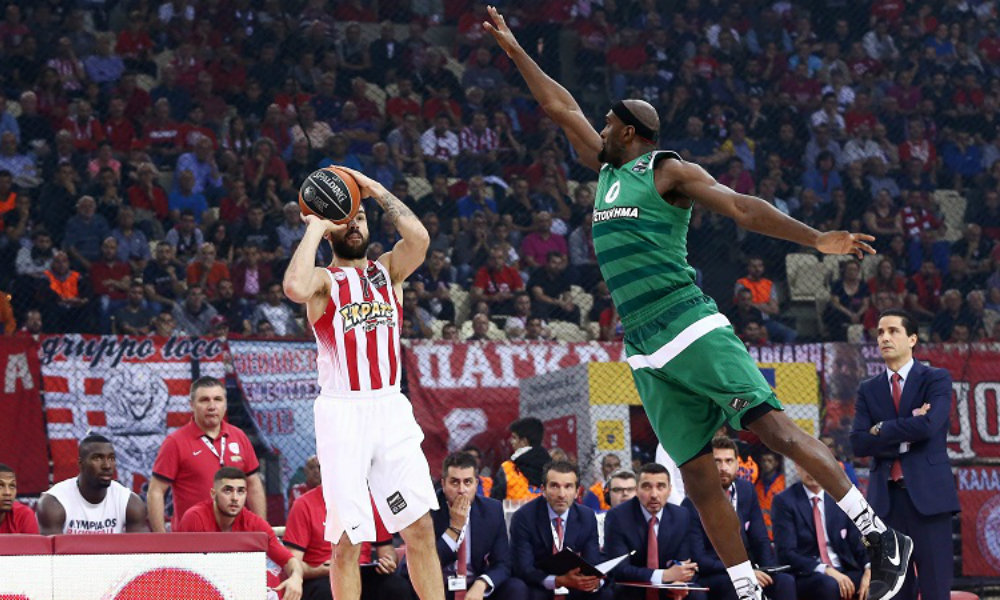
So, it’s come to this… A game 5 between Olympiacos and Panathinaikos is always eligible to become a European classic. The two “eternals” are too eager, too concentrated and too selfless in light of the title game. This game is liable to be in our memories for many years (for the game itself). If the two of them are the window of our league, this match on the edge of the hill is the most expensive product that can attract any interested parties.
Everything is set aside… They are tired, they are carrying injuries, they are not in their best physical condition, but they are here… It will be hard. Tough. Maybe even “ugly”. But there’s nothing more attractive than a game with no tomorrow. These are not some crumbles of stale fame and rotten myths. This is the truth… Two strong teams, after a tiring season with very strong emotions fight for the … stake in the room. With an eye on tomorrow, as these are forty minutes that may decide contracts and decisions for the next day both in terms of individuals and the teams. The home court always gives an edge in these cases. Especially when we are talking about the home court (and the team) of Olympiacos. The Reds have the personalities and the players with the intangibles to close a series, in which it seems that they are being left behind as time goes by. Olympiacos have reached their limits. I wouldn’t swear if they could follow in Best of 7 finals… This is where Panathinaikos bet as their team proves how difficult it is to be matched by the champions. Pascual’s Greens are (marginally) the best team in the series so far. They have more breaths, energy (powered by Xavi Pascual’s mind) and freshness, but playing over your limit is mainly done through the power of your mind. We are looking at a close match with ups and downs in the score (and the possibility of comebacks) with the AST/TO ratio setting the carpet for the final stretch. A game of great shots, perception and mainly willingness to fight.
After all, happiness heals the body, just like pain develops the power of the mind…
Let’s enjoy the game…
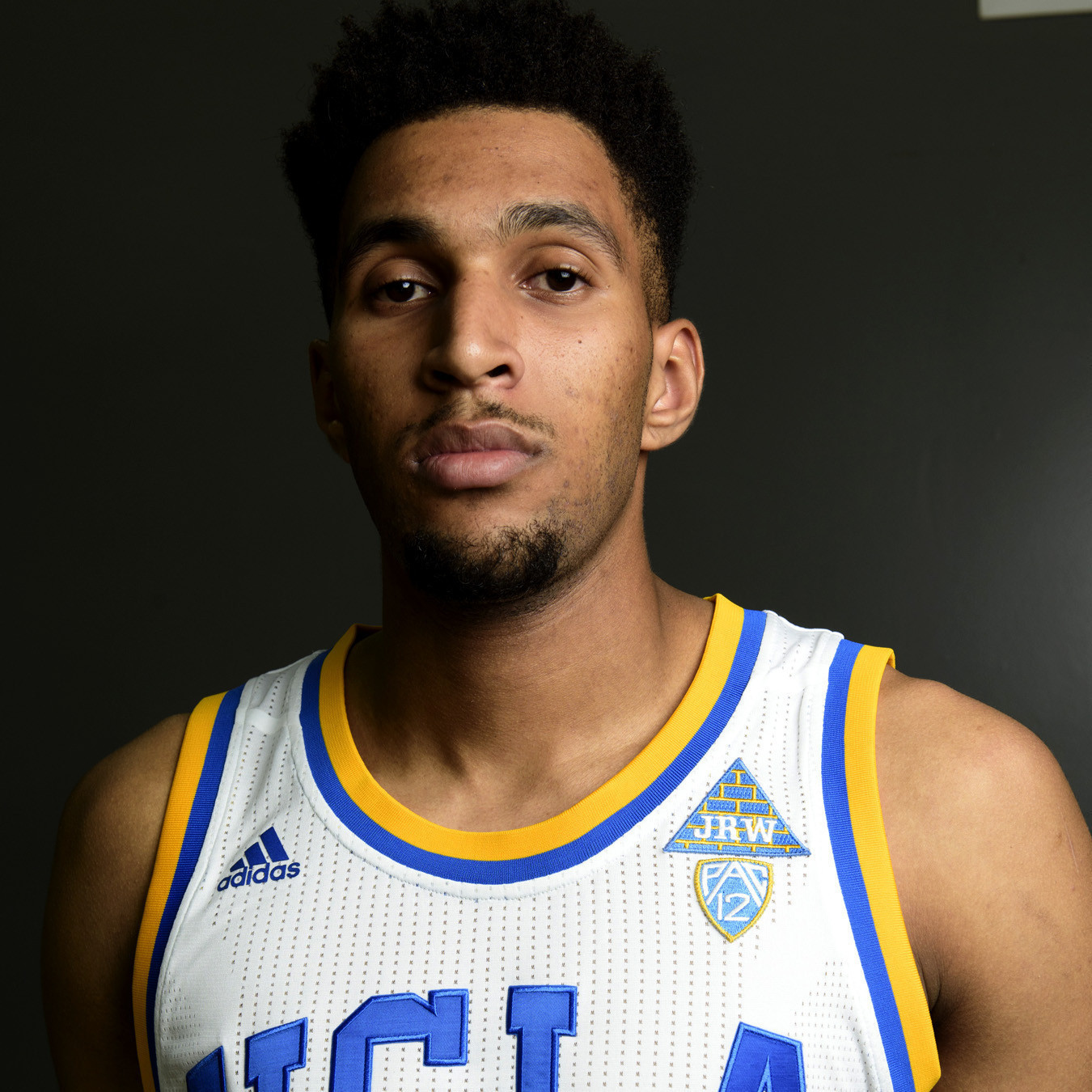
P.S: Cverna Zvezda and John Bolden have shaken hands. We had talked about him about a month ago. I would like to see our teams work with these players, whose packages are interestingly interpreted in Euroleague basketball. This is why I was a supporter of keeping Alexander Vezenkov in our country, even if they had to “spend” a foreign player place.
P.S.1: Besiktas and Valencia are ready and spiritually strong. Kudoz to coach Sarica (he missed an important opportunity). Valencia fought like a hungry dog, but the old timers of Madrid (Llull, Rudy, Reyes) know how to win games of details at this level. Been there, done that…
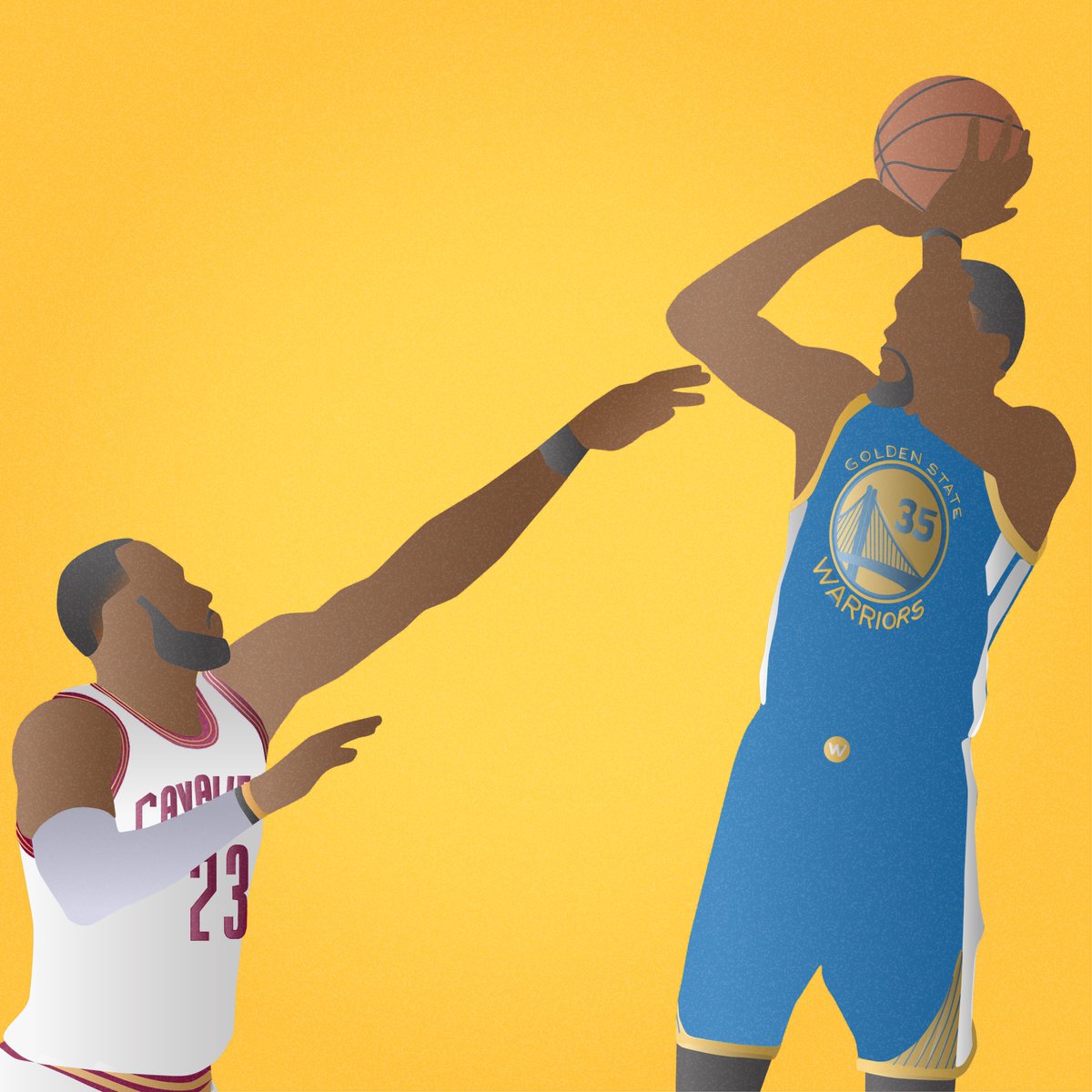
P.S.2: We are at the most important point. The Warriors’ first defeat and the Cavs are showing signs of life. An arrow went through what seemed to be a body made of steel for the Warriors. The damage it may cause to their minds by placing “doubts” in them we’ll see in game 5. The Warriors are “there” again, and they are facing their ghosts. Either they exorcise them, or they are eaten alive. The die is cast.
Translated by George-Orestis Zoumpos



